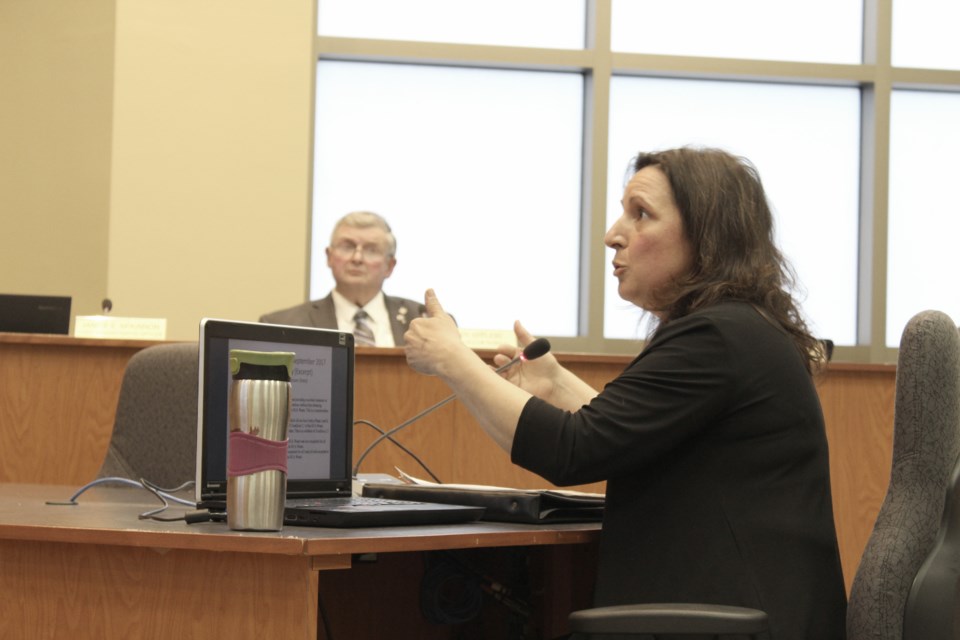Ramara should beef up its bylaws to prevent soil contamination before it’s too late, township council was told Monday night.
Carmela Marshall, a director and senior researcher with the Ontario Soil Regulation Task Force, made a presentation to council, cautioning the township about potential loopholes in its site-alteration bylaw and urging it to consider the task force’s recommendations when reviewing the document.
Armed with examples of contaminated soil being dumped in municipalities such as Scugog, Kawartha Lakes and New Tecumseth, Marshall said she wants Ramara to put measures in place to avoid the same costly fallout those places experienced.
At the heart of the matter is a proposed shooting range on Concession Road 5 in Ramara. The previous owner of the property had a site plan and a building permit, which allowed the township to exempt the owner from a part of the bylaw that would require him to enter an agreement with the municipality if more than 2,000 cubic metres of fill would be on the site.
Marshall wants the township to not offer any exemptions that are not required under the Municipal Act.
“It has the potential to be taken advantage of,” she said of the exemption. “It’s good to close that loophole.”
The task force recommends a large-scale fill agreement be mandatory when a project includes 1,000 cubic metres, or more, of fill.
With tens of thousands of cubic metres of soil having been trucked to the site prior to the change in ownership, better testing should also be undertaken, she said.
Three samples were tested from the fill before it was brought to the township. That isn’t enough, Marshall said, considering the amount of soil.
“Property owners should be required to obtain their own qualified person to oversee it,” and then the township should be permitted to do its own testing on an ongoing basis and, if the results are not satisfactory, remove the permission given to the landowner, she said.
One of the task force’s recommendations reads: “Stipulate the need for Township review of source sites before importation of fill and the ability to remove Township approval of source sites at any stage of the operation.”
Here are some of the other recommendations from the task force: “Include the ability to further restrict hours of operation, haul routes and volume of trucks per day to address social impacts to the community,” “require a farm study submitted by a Professional Agrologist when large scale fill is proposed to improve farmland,” “require the installation of ground water monitoring wells for larger scale projects,” “require ‘tipping fees’ to cover costs of doing your own random and frequent audit testing of imported fill materials,” and “ensure that it is understood that all documentation, source site soil reports, etc. will be peer reviewed by the Township at the owner’s expense.”
Marshall’s presentation attracted the interest of some on council, including Deputy Mayor John O’Donnell.
“I would like to get permission from the current owner to go in there with a backhoe,” he said, collect multiple soil samples and send them for independent testing.
“I would feel more confident than I do now.”
No new fill has been brought to the Concession Road 5 property since ownership changed in June 2017, but that likely won’t be the case for long. The new owner has bigger plans for the site, Mayor Basil Clarke noted. Three shooting ranges and bigger buildings are part of the plan, which means a new site plan needs to be approved by council. He said council will consider changing the bylaw to state property owners may be exempt if the project includes up to 2,000 cubic metres of fill, while any more would need council approval.
The residents who have expressed concern over the amount of fill being dumped on the site have highlighted a number of issues, but Clarke feels they simply “don’t want the gun range.”
“So, right now the focus is on the soil,” he said, “and their next focus will be on noise.”
In her presentation, Marshall mentioned the case of an airport site in Greenbank in Scugog Township. That township has launched a $105-million lawsuit after contaminated soil was found on the property. That, despite what seemed like plenty of oversight, Marshall said.
“They still had significant contamination,” she said.
Clarke questioned a municipality’s enforcement abilities when the site in question is an airport, saying it is federal jurisdiction, and residents were fed up.
It is a “common misconception,” Marshall responded, that local bylaws do not apply in those cases.
“It’s one of the big reasons we have a new council in Scugog,” she said, adding the previous council seemed to wash its hands of the matter, citing federal jurisdiction.
Ramara resident Ron Reid attended Monday’s meeting and wants to see better soil-testing procedures in place.
“There’s a lot of fill that’s contaminated that’s going to rural sites rather than where it should go — a remediation facility. There’s very little in the way of controls, in the way of routine inspecting to make sure it’s safe,” he said.
Taking a few small samples from massive mounds of soil is not sufficient, he said.
“It’s pretty easy for a lot of stuff to get missed.”
Reid said many residents “feel like the township is letting them down” when it comes to being strict about soil regulations and bylaws.
Clarke said the task force’s recommendations will be considered when the township reviews its site-alteration bylaw.
